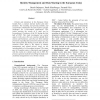Free Online Productivity Tools
i2Speak
i2Symbol
i2OCR
iTex2Img
iWeb2Print
iWeb2Shot
i2Type
iPdf2Split
iPdf2Merge
i2Bopomofo
i2Arabic
i2Style
i2Image
i2PDF
iLatex2Rtf
Sci2ools
108
click to vote
HICSS
2006
IEEE
2006
IEEE
Identity Management and Data Sharing in the European Union
Citizens and enterprises in the European Union benefit from a common internal market and other freedoms. The resulting and growing mobility and cross-border collaboration necessity leads to specific challenges for e-Government applications. This article presents the results of a study run by Luxembourg’s Presidency of the EU during the first half of 2005. This study investigated one central aspect in this area: How do countries identify their citizens and businesses, and what are their national provisions regarding data protection and privacy that limit and regulate the sharing of such data? In more technical terms: What is the impact of identity management and related privacy issues on the interoperability of e-Government systems? The status quo in 18 member states is illustrated, and compared
Biometrics | Common Internal Market | Cross-border Collaboration Necessity | European Union Benefit | HICSS 2006 | System Sciences |
Related Content
| Added | 11 Jun 2010 |
| Updated | 11 Jun 2010 |
| Type | Conference |
| Year | 2006 |
| Where | HICSS |
| Authors | Benoît Otjacques, Patrik Hitzelberger, Fernand Feltz |
Comments (0)

